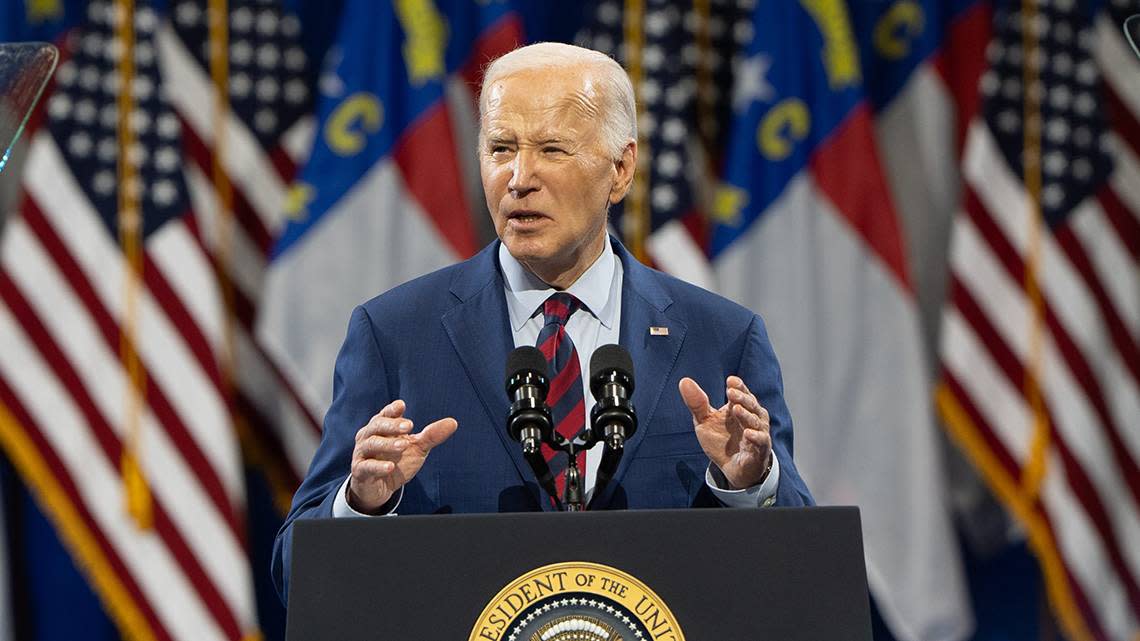Biden signs order restricting asylum-seeking at border. Here’s how it affects California

President Joe Biden on Tuesday temporarily blocked most asylum-seeking at the U.S. southern border, announcing an executive action that prevents migrants from staying in the United States when unlawful immigration surges.
The order also will affect those seeking asylum along California’s coast.
Restrictions kick in once average daily encounters between migrants crossing illegally and border officials reach 2,500 over the course of a week. Because this has already occurred this week, the rule would start at midnight, officials noted.
The new policy is certain to face legal challenges from immigration advocacy groups. Officers can expel migrants to Mexico or their home countries within hours or days under the proclamation.
“Migrants will be restricted from receiving asylum at our Southern Border unless they seek it after entering through an established, lawful process,” Biden said in announcing the action on Tuesday. “Those who seek to come to the United States legally, for example by making an appointment and coming to a port of entry, asylum will still be available to them.”
The rule applies not only to those trying to cross the country’s southern land border with Mexico, but also to immigrants attempting to enter the country illegally along U.S. “southern coasts,” including California’s shores. When those individuals are encountered on land by U.S. Border Patrol, they too will be rendered ineligible for asylum and face expulsion, a U.S. official told McClatchy.
The border reopens once the encounter average falls to 1,500 or fewer over the course of a week. Once that average is sustained, the border reopens for asylum-seekers after two weeks.
Biden’s proclamation comes under two sections of the Immigration and Nationality Act. There are exceptions for unaccompanied children, trafficking victims and migrants who use the CBP One application to enter lawfully.
Migrants can still claim asylum during the periods of restriction, but the bar to entry will be far higher. Those who cross unlawfully could face a five-year ban from reentering the United States.
Biden’s action mirrors a Trump-era attempt in 2018 to cap migration that was struck down by federal courts.
The American Civil Liberties Union, which led the lawsuit against Trump then, said it intends to sue the Biden administration over the new action.
Already, the Trump campaign issued a statement accusing Biden of not going far enough, criticizing the president for exempting unaccompanied children from the expulsion policy. Biden’s action drew ire from some Democratic and Republican lawmakers, including from California, for different reasons.
“By reviving Trump’s asylum ban, President Biden has undermined American values and abandoned our nation’s obligations to provide people fleeing persecution, violence, and authoritarianism with an opportunity to seek refuge in the U.S.,” Sen. Alex Padilla, D-Calif., said Tuesday.
“This asylum ban will fail to address the challenges at our border, just as it did under the Trump administration,” said Padilla, the chairman of the Senate’s Judiciary Subcommittee on Immigration, Citizenship and Border Safety, who has been critical of recent border legislation. “It will lead to people with legitimate asylum claims being prevented from seeking safety and returned to harm.”
Republican leaders also criticized the action.
“If he was concerned about the border, he would have done this a long time ago,” House Speaker Mike Johnson, R-La., told reporters on Tuesday.
The number of migrants per month trying to enter the U.S. has declined since December 2023. That month, the number of immigrants crossing the border hit a record monthly high when the Border Patrol stopped almost 250,000 people at the southwest border. In April, there were 128,900 encounters.
The last time border crossings were at 1,500 a day was in July 2020, a few months into the coronavirus pandemic.
Biden stressed that Congress must still pass legislation to better fund border patrol and immigration policies.
The rule follows a similar congressional package that Republicans tanked this February; former President Donald Trump pressed lawmakers not to support the current White House’s efforts to curb immigration. The legislation failed to pass in the Senate again last month.
“I’ve come here today to do what the Republicans in Congress refuse to do: Take the necessary steps to secure our border,” Biden said Tuesday. “Four months ago, after weeks of intense negotiation between my staff and Democrats and Republicans, we came to a clear, clear bipartisan deal. It was the strongest border security agreement in decades.”
But then Republicans walked away, Biden said: “Why? Because Trump told them to.”
Immigration has become a focal point for the November election, which is expected to see a rematch of the 2020 election between Biden and Trump.
Congress hasn’t passed comprehensive immigration reform in decades. The Senate passed a bipartisan measure in 2013 but it went nowhere in the House. Instead, over the years, lawmakers have often used the polarizing issue as a political football.


